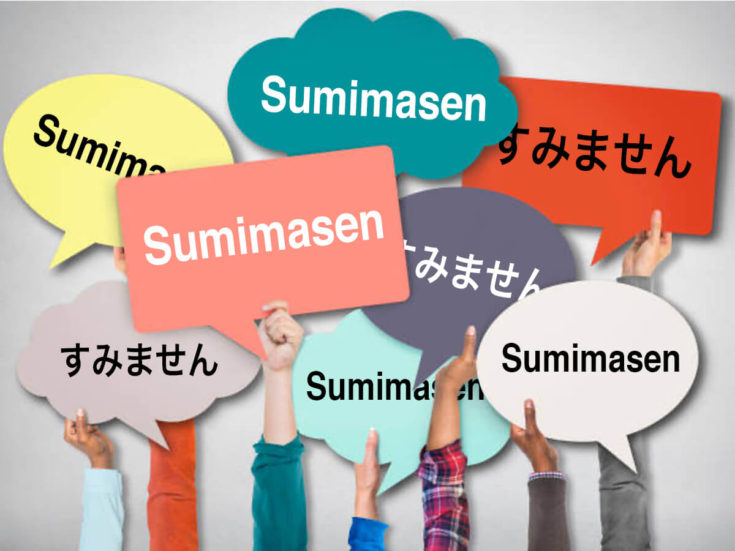Have you often heard or been called “sumimasen すみません” in public places or stores? When you’ve heard the word “sumimasen” as an apology, did you wonder, “Why do Japanese people always apologize by saying, “sumimasen.” “ Why do Japanese people apologize in such situations?” This word is one of the most commonly used by many Japanese in their daily lives.
In fact, this “sumimasen” is a word that changes depending on the situation. So today, I’d like to introduce you to the “sumimasen” which has some different meanings. I hope you will understand when and how to use it and feel free to use it yourself.
1. Origin of the word
“Sumimasen すみません” is derived from the verb “sumu すむ,” and is written “済む” in Chinese characters. It is used to mean “work is done” or “business is done. This word “sumu 済む” is of the same origin as the word “sumu 澄む,” meaning without muddiness or mixture. From its meaning, “sumu 澄む” represents the meaning of “feelings settle down” or “feelings are cleared.” “Sumimasen すみません” is a polite way of saying “not finished 済んでいない,” which cancels out the verb “sumu 済む.” So, the usage of “Sumimasen” is to cancel out “feelings settle down,” which means “my feelings don’t settle down” or “my feelings don’t clear up.
The affirmative “sumu 済む” was used in the sense of feeling relieved in the Muromachi period (1336-1573). Later, in the Edo period (1603-1867), the negative form “sumimasen すみません” appeared and came to be used to mean “I cannot settle my feelings” or “I‘m not satisfied with my feelings” etc. Today, “sumimasen” is used to express an apology, gratitude, or a request to others. Let’s take a look at the situations under which it is used.
2. The three situations
1. Apology

You can use “sumimasen” when you have done something rude to another person and need to apologize. This is the same as the English expression “I’m sorry.” In this case, when you fail to keep your word or fail to do something, you can use “sumimasen” to express that you cannot keep your mind clear.
However, “sumimasen ” is a casual and light apology, so in business or formal situations, it is better to use “moushiwake-gozaimasen 申し訳ございません” “moushiwake-arimasen 申し訳ありません,” etc.
2. Gratitude

For example, when you help someone with their luggage, make way for others or open the door for someone, etc., Japanese may say, “sumimasen.” The “suimasen” said when you have done something for them is used as a “thank you.” This includes feeling sorry that you are unable to do anything in response to something they have done for you.
Personally, I believe that the word “arigatou ありがとう” is the word that makes both others and myself happy, so I try to use “arigatou” instead of “sumimasen.”
3. Request

The “sumimasen” when you address someone is both an apology and a thank you. This can be expressed in English as “Excuse me.” When we ask them to do something, we are putting some burden on them. For example, when you stop someone on the street, you put the burden on them to interrupt their action and turn around to look at you. So we Japanese call out to them, “sumimasen” with apologies and thanks.
Conclusion
Here I have organized the three meanings of “suimasen,” but there is actually a foundational thought. It is a feeling of “I’m sorry.” However, this is not an outward remorse for causing trouble to the other person, in other words, it is an inward remorse for oneself who causes trouble. The book about Japan decades ago, “The Chrysanthemum and the Sword” by Ruth Benedict, once described Japan as a culture that values “shame.” The “shame” may be a feeling of remorse, of feeling sorry for causing some burden to others, and of I cannot settle my feelings. When I think of “shame” as feeling sorry for others, I feel like it is understandable that Japanese people often use “sumimasen.”
In addition to “sumimasen すみません,” you may also hear “suimasen すいません” “sunmasen すんません” “sunmahen すんまへん” etc. All of them are variants of the formal written word “sumimasen,” and none of these are wrong. “Suimasen” is the spoken language, and “sunmasen” and “sunmahen” are in the Kansai dialect.
I hope you have understood that the word “sumimasen すみません” contains a variety of feelings. However, we Japanese often use “sumimasen” without being conscious of deep meaning. Why don’t you feel free to use it in three different situations?
Thank you for reading to the end!
Business training instructor. I’m originally from Takarazuka in Hyogo Prefecture in the Kansai area. Now I live in Yokohama. I love exercising, traveling, watching movies, art, and nature.





 HTJ has a YouTube page! Check it out
HTJ has a YouTube page! Check it out
Your article on the history of “sumimasen” and the analysis of the meaning behind that word was very intresting! Especially, the reasons for saying “Sumimasen” instead of “Arigatou” really made sense to me. Thank you for sharing. I look forward to your next article.